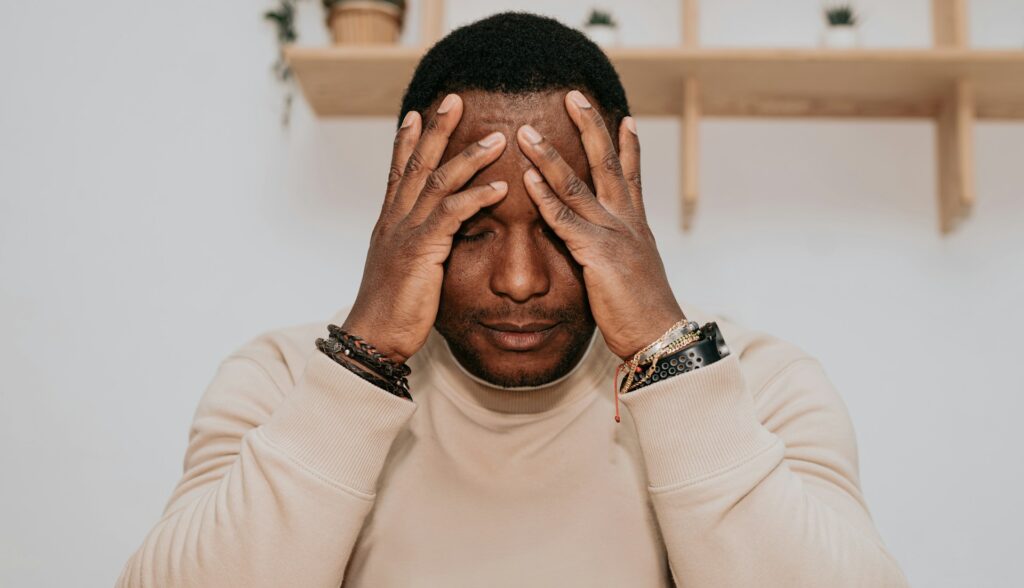Feeling numb or hollow inside isn’t always obvious from the outside.

A lot of people who feel emotionally empty still show up, smile, and say all the right things. That being said, if you listen closely, there are certain words they use that can quietly hint at what’s really going on underneath. If you hear these phrases a lot from someone not just once or twice, but pretty regularly, they’re clearly trying to hide the fact that inside, there’s not much light left, if any at all.
1. “I’m just tired, that’s all.”

It’s one of the easiest ways to explain away emotional exhaustion without having to get into it. When you feel empty but can’t put words to it—or don’t feel safe doing so—saying you’re “just tired” covers a lot of ground. It deflects concern without inviting more questions. Of course, behind those words, there’s often a deeper kind of fatigue—the kind that sleep can’t fix, and that sometimes feels easier to deny than to confront.
2. “I’m fine, really.”

This is a classic default when you don’t have the energy or willingness to unpack what’s wrong. Saying “I’m fine” keeps the conversation moving and stops people from probing into feelings you might not even fully understand yourself. It’s not necessarily a sign that they’re purposely lying. It’s about protecting yourself from the vulnerability of admitting just how disconnected or flat you actually feel inside, especially when you’re not sure what kind of reaction you’d get.
3. “It’s whatever.”

When people feel dead inside, they often start to detach from things they once cared about. Saying “it’s whatever” is a way to shrug off disappointment, anger, or sadness without having to sit in it too long. It’s a verbal shield—an attempt to avoid confronting just how little things seem to matter anymore. The more often this phrase comes up, the more it hints at an underlying numbness that’s not being addressed.
4. “I don’t really have an opinion.”

Indifference becomes a safe space when caring too much hurts. Saying you don’t have an opinion can be a way of protecting yourself from decisions, emotions, or conflicts that just feel too heavy to deal with. It’s not necessarily that they genuinely don’t care. It’s that staying neutral feels safer than risking another emotional hit. When you’re already running on empty, even small emotional investments can feel too costly.
5. “I’m just over it.”

Sometimes “I’m over it” sounds strong, like a declaration of boundaries. However, sometimes it’s code for a deeper kind of defeat—the sense that nothing really gets better, no matter how hard you try. For someone who feels hollow inside, this phrase can mask a deep layer of hopelessness. It’s easier to sound dismissive than it is to admit you’ve quietly stopped believing things can actually change.
6. “It doesn’t matter.”

Repeatedly saying “it doesn’t matter” can start to become a worldview when emotional numbness sets in. It’s a way of stepping back from conflict, sadness, or hope before they have a chance to touch you. It’s not true indifference; it’s self-protection. Choosing not to care becomes a habit because caring, even a little bit, feels too risky when your emotional reserves are already dangerously low.
7. “I’m just busy, that’s all.”

Keeping busy is a socially acceptable way to mask emptiness. Saying you’re “just busy” makes it sound like everything is fine, even when underneath it, you’re filling every moment just to avoid sitting with yourself. For someone who feels hollow, stillness can feel unbearable. So overworking, over-scheduling, and staying “too busy” becomes a way to outrun the ache for as long as possible.
8. “Other people have it way worse.”

Minimising your own pain is a classic coping strategy when you don’t feel entitled to your feelings—or when facing them feels too overwhelming. Comparing yourself to people who have it “worse” offers a fast way to silence yourself. The thing is, pain doesn’t exist on a sliding scale where only the worst cases count. Downplaying what you’re going through only deepens the disconnection from yourself and makes it harder to ask for help when you need it.
9. “I’m just being dramatic.”

Preemptively calling yourself “dramatic” is a way to dismiss your own feelings before anyone else gets a chance to. It’s a defensive move born out of fear—fear of judgement, rejection, or being seen as weak. When you feel dead inside, even small flickers of real feeling can feel dangerous. Brushing them off as “drama” is often a way to shut them down fast, before they break through the numbness you’ve built to survive.
10. “I’m not really into anything right now.”

Loss of interest is a huge red flag for emotional numbness. When everything feels flat, meaningless, or too exhausting to engage with, it’s easy to shrug and say you’re “just not into anything right now.” It sounds casual, but it can signal a deeper disengagement from life itself—the slow fading of passion, curiosity, and connection that comes when you’re running on emotional fumes for too long.
11. “I’m used to it.”

When hurt, disappointment, or loneliness becomes a regular part of your emotional landscape, saying “I’m used to it” can feel like armour. It points to a grim acceptance that things aren’t going to change. However, normalising emotional pain doesn’t make it healthy. It just makes it easier to ignore how deeply the wounds still hurt—and harder to believe you deserve anything different or better.
12. “I don’t really care either way.”

Indifference often sounds like strength, like you’re too cool or too wise to get caught up in the drama. Sadly, for many people feeling dead inside, it’s not real peace—it’s resignation disguised as apathy. When you hear this phrase enough, it often signals a survival mode mindset where detaching from emotions feels safer than risking more disappointment or pain you no longer feel equipped to handle.
13. “I’m just tired of everything.”

There’s a specific kind of tiredness that goes beyond needing sleep—it’s emotional exhaustion. Saying you’re “tired of everything” is often the closest someone gets to admitting they’re overwhelmed by the sheer weight of living. It’s not laziness or negativity. It’s the natural fallout of carrying emotional burdens without enough support, hope, or moments of real relief to balance the load.
14. “I’ll deal with it later.”

Procrastination isn’t always about poor time management. Sometimes, it’s about emotional paralysis—feeling too drained to face even basic tasks, let alone big emotional confrontations or decisions. Putting things off can be a quiet form of survival. It’s easier to delay dealing with life when life already feels overwhelming, empty, or painfully unmanageable from the inside out.
15. “I’m not really looking for anything serious.”

In relationships, people who feel disconnected from themselves often avoid deep emotional investments. It’s not because they don’t want connection—it’s because they don’t trust themselves to handle the vulnerability that comes with it. Claiming not to want anything serious can sometimes be a shield to avoid being hurt—or revealing just how unavailable they feel, even to themselves, under the surface.
16. “It is what it is.”

At first glance, this sounds like radical acceptance. But often, it’s a sign of deep resignation—a way of saying “I don’t expect anything better anymore” without actually speaking the pain out loud. It’s easier to sound wise and detached than to admit you feel powerless, numb, and quietly heartbroken by how life has unfolded. But under the surface, that feeling is often still very much there—waiting to be seen, heard, and healed.


